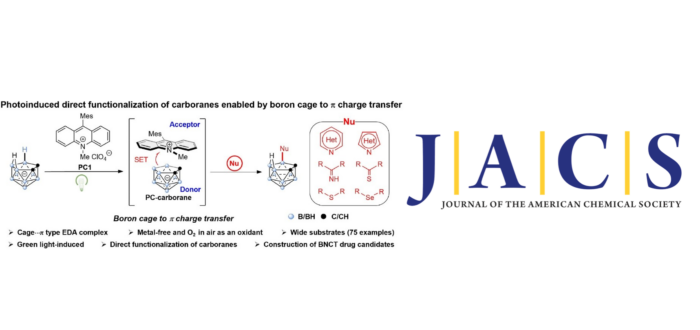Last Thursday 21st March the 1st IQCC Day took place. This activity is part of the Networking IQCC activities. We did an excursion around Estany de Banyoles and then we did a calçotada/BBQ. The idea is that, from now on, we will do once a every year in March. Below you can find some photos: Girona, April 2nd, 2024 For more info: ges.iqcc@udg.edu
- sec.iqcc@udg.edu
- +34 972 41 83 57
News
The development of new synthetic methods for B–H bond activation has been an important research area in boron cluster chemistry, which may provide opportunities to broaden the application scope of boron clusters. Herein, we present a new reaction strategy for the direct site-selective B–H functionalization of nido-carboranes initiated by photoinduced cage activation via a noncovalent cage···?
Joint experimental/computational studies in chemistry provide new complementary insights which are unattainable by experimental or computational chemistry alone. This is confirmed once again by a recent paper in the Proceedings of the National Academy of Sciences USA by research groups of Prof. Que (Univ. Minnesota) and Prof. Swart (ICREA and Univ. Girona). They collaborated in understanding
8th of March is International Women’s Day. The IQCC has currently a rather favourable balance in gender ratio of staff members, both at the Master level (54%), PhD level (47%), postdocs (17%) and permanent researchers staff (29%). Notably, out of the 4 most recent permanent members, 2 are men and 2 are women, reinforcing one
Last 28th February took place the 60 years celebration of Prof. Miquel Solà. This wonderful moment was celebrated by a symposium in Girona. Schedule (Aula Magna, Science Faculty) 10.30h Opening by Director of Department of Chemistry Dr. Albert Poater 0.35h Prof. Agustí Lledós – “La química teòrica des dels 80s a la UAB” 11.00h
Marc Garcia-Borràs receives Marcial Moreno-Mañas Award 2023 for young researchers of RSEQ-Cat This week the Real Sociedad Española de Química (RSEQ) announced that Dr. Marc Garcia-Borràs, Ramón y Cajal fellow at the Institut de Química Computacional i Catàlisi (IQCC) of the UdG, received the Marcial Moreno-Mañas Award 2023, for his scientific career of quality and excellence. The Marcial Moreno-Mañas Prize for Young Investigators
Last month (February 25-27, 2024) took place the XIV Spanish-Italian Symposium on Organic Synthesis in Torino (Italy), which included a poster session. Filippo Scarchilli, PhD student under the supervision of Prof. Miquel Costas, presented a poster titled “Highly selective C(sp3)–H bond oxygenation at remote methylenic sites enabled by polarity enhancement”, and won one of the poster prizes.
Prof. Sílvia Osuna, ICREA Professor at the Institute of Computational Chemistry and Catalysis (IQCC) of the University of Girona (UdG), has been awarded a new European Research Council (ERC) Proof of Concept grant (ERC-2023-POC-101158166). This new ERC-POC is directly related to her previous ERC Starting Grant project NetMoDEzyme and adds to the running ERC-POC GREENZYME
A few times a year, the IQCC opens its doors and gives the opportunity to high-school students to know our work through exciting lectures and computational and experimental workshops. This provides the secondary school pupils the possibility to get a feel for the research and have real-time chemistry in their hands. Last 22nd February, it was
Catalysis with engineered enzymes has provided more efficient routes for the production of active pharmaceutical agents. However, the potential of biocatalysis to assist in early-stage drug discovery campaigns remains largely untapped. In this study, we have developed a biocatalytic strategy for the construction of sp3-rich polycyclic compounds via the intramolecular cyclopropanation of benzothiophenes and related heterocycles.










